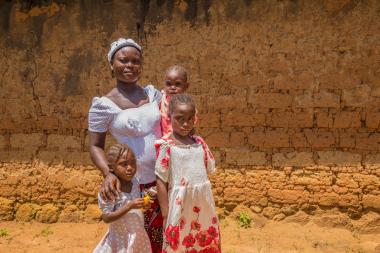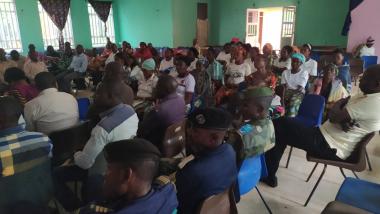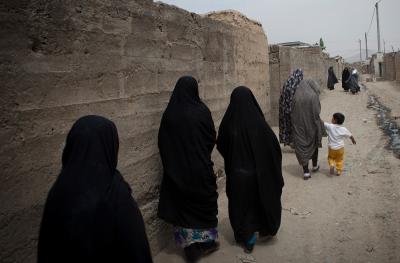Earlier this week, Virginia became the 38th state to ratify the Equal Rights Amendment (ERA), providing the necessary majority for the ERA to move forward in becoming part of the U.S. Constitution.
Knowing you have rights is universally transformative: Social empowerment trainers across all of our country programs begin sharing the importance of rights from the moment women start the program, and especially when trainers begin to see changes in the women themselves. Our curriculum dives deeper with a section on gender equality, rights, and decision-making.
Because when women know they have rights, they know they matter and can demand that their rights are honored.
So in celebration of this 38th ratification, we wanted to share with you some of what women in our program learn about their rights.
Universal Human Rights
Proclaimed by the UN General Assembly in 1948, the Universal Declaration of Human Rights affirms “inherent dignity and of the equal and inalienable rights of all members of the human family.”
Classes stress that human rights are those rights which all human beings are born with, no matter what their race, age, sex, religion, nationality, marital status, or personal beliefs. Human rights allow us to live in dignity and be respected.
All human beings have natural rights they are born with and that cannot be taken away by anyone.
When a person’s rights are violated, this is an act of injustice. When people demand their rights, they are fighting for justice and for what they deserve. Promoting women’s rights is fighting for justice, not asking for a favor.
A government can protect natural rights of human beings by creating laws, but governments do not grant people human rights: We do.
National Laws
The governments of many countries where we work have laws that guarantee some women’s rights.
So why do we say that we work in some of the hardest places in the world to be a woman? Often, there exists a gap between what happens on paper and what happens in practice, which comes from traditional, customary laws, social norms, and women not knowing they have rights. While customary laws and social norms aren’t always bad, they don’t always protect women and girls, sometimes working against them.
Here are a few examples of national laws where we work and what happens when women know and demand their rights:
Nigeria
In Nigeria, there are many cases where women can inherit land – which is crucial to having economic opportunities – but many people don’t know and violate that right. When a husband dies, often the wealth is divided amongst his own brothers or family members, rather than his widow or children. Many men do not realize the importance of writing a will, which could help alleviate some of these challenges if implemented properly.
When Faith’s husband died, his family took all of the land, leaving her and her children in poverty. Through Women for Women International’s program, she learned a skill to support her family and learned about women’s inheritance rights. She’s taught the people around her about inheritance, including her own father, who has included Faith and her sister in his inheritance alongside their brothers.
Democratic Republic of Congo
Having a marriage certificate is crucial for many women to protect their own rights to inheritance, property, and child custody – as well as the rights of their children, including access to healthcare or education. In countries where polygamy is not allowed, it can also prevent a man from having multiple wives.
Alice, a graduate of our program in Mumosho, advanced to our Change Agents advocacy program and now advocates for women’s rights in her community. She and other Change Agents have begun raising discussions with other leaders in their community about the strong connection between the marriage certificate and protections for women and children. They have encouraged more women to gain marriage certificates and by advocating local government officials, made it easier for couples to register their marriages – helping more women claim their rights and secure the future of their families.
Afghanistan
Afghanistan promises many rights to women, including the right to employment and even to run for office. Yet we know that the reality for women is precarious: Often, women are not allowed to leave their homes, seek an education, and continue to live in fear of domestic violence due to societal norms and gender inequality.
Some graduates of Women for Women International’s program have gone on to run for local office. Women in our Change Agents program learn advocacy skills and secure meetings with government officials – including a personal meeting with Rula Ghani, Afghanistan’s First Lady – to discuss advancing women’s rights and opportunities. In Nangarhar province, Change Agents secured a commitment from the Department of Martyrs and Disabled people to provide aid to 10 disabled people in the province and the establishment of a Madrasa for 35 women.
The Madrasa is a local school that will educate women about their basic rights – including a right to education – using Islamic studies.
Protecting and Advancing Justice
Just as the ERA may face more barriers before cementing women’s equal rights as law of the land, legal protections for women all over the world have a long journey – on paper and in practice.
Since societal expectations play a big part in restricting gender equality, Men’s Engagement programs are critical. Engaging men is crucial for long-lasting, impactful change. Through the program, men learn about societal norms that are harmful to both the women in their communities and themselves through upholding negative expectations for men. By addressing these social norms, the program hopes to transform communities so both men and women have equal rights and opportunities to fulfill their potential.
Along with teaching women about their rights, Women for Women International’s program teaches women to advocate for themselves. Through practical exercises and role play, the women in our program learn to actualize these rights to improve their communities. For instance, the Change Agents in our Nigeria program are now seen as leaders in their communities. They often intervene and assist in cases of domestic violence and even serve as mediators during community conflict. Recently, Change Agents hosted negotiations between Fulani herdsmen and local farmers to address the violence between the two groups – and begin building peace.
The women in our programs are a testament to what happens when women know they have power and come together to use it: They make the world better.



